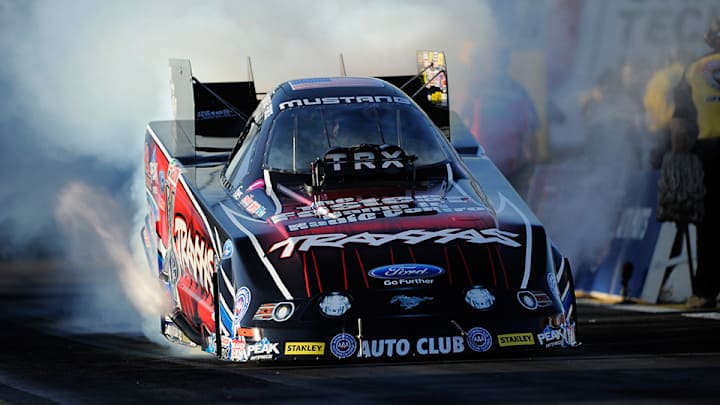Courtney Force is pushing the limits of racing culture in the NHRA

When it comes to NHRA driver Courtney Force, the puns are plentiful: she’s a driving Force, a Force to be reckoned with, a Force on the track, this driver is out in Force.
The puns are also precise: the 26-year-old’s power and dominance in the sport of drag racing spring from her last name, or more specifically, her roots.
As the daughter of John Force—a drag racing legend with more than 35 years experience and 16 NHRA Funny car titles to his name—Courtney grew up at the track, cleaning cars, drawing pictures of herself racing, watching her father break records and celebrating his victories in the winner’s circle. Courtney dreamed of being just like her father.
In most sports, a daughter would have had to make some adjustments to a dream of following her father's path. If John had been, say, a basketball player, Courtney would have looked not to the NBA, but to the WNBA. Had he played baseball, she'd have had softball. And if he was a football player, she would have found a women's league for that too. But John is a funny car driver in the NHRA and Courtney, she's one as well. In July, she beat her father at the Sonoma Nationals to become the winningest female driver in Funny car history. Before that, she drove her 8,000-horsepower Traxxas Ford Mustang for the historic 100th NHRA victory for a female driver. While Courtney has five national event wins in Funny Car, her father has 140, but she has defeated John Force in two out of their three final-round appearances together.
"It's pretty surreal to roll up to the stage with my dad in the other lane," Courtney says. "I grew up watching him and now I get to compete against him."
That head-to-head, male vs. female competition landscape of the NHRA—and its overall acceptance of female drivers—is often credited to one of the sport's pioneers, Shirley Muldowney.
At a time when motorsports were less about finances, sponsorships and technology, Muldowney started as a street racer in the late 1950s and worked her way up through the sport to become the “First Lady of Drag Racing.” In 1976, Muldowney became the first woman to win the NHRA Spring Nationals and later became the first driver, male or female, to take three World Fuel Championships, in 1977, 1980 and 1982. Although she says a lot has changed since her racing days, she’s proud to see female drivers like Courtney Force competing today.
“The car doesn’t know if there’s a male or female driving it,” Courtney says. “You have to be strong enough mentally and physically to take these guys out race by race.”
"The NHRA was the first to accept women, and I'm one of the only ones in the world that has competed against men, and beat them!" says Muldowney. "We're in a man’s sport and they were ugly to me in the beginning, so I'm glad to see the girls today."
The top women of the NHRA—including Force, Erica Enders-Stevens, Alexis DeJoria and others—have experienced the association’s embrace of females as competitors in a way that other motorsports, and other mainstream sports, have not. Just as football has the Super Bowl, and NASCAR has the Daytona 500, the NHRA has its prestigious, pinnacle event: this Labor Day weekend, the regular season culminates with the 60th annual U.S. Nationals, drag racing’s premiere race, held at Lucas Oil Raceway in Indianapolis. The women will be racing, and Muldowney says that, unlike Danica Patrick in NASCAR, the NHRA women will also be competing.
“Danica Patrick is sometimes a marketing tool for NASCAR, and I would not put Courtney or any of these girls in that category,” she says. “I’m proud to see them out there, with their necks on their line. The boys better get used to it because we’re here to stay.”
Although Courtney and John Force both admit that their family’s equipment, financial backing and training have helped drive their success, neither can deny the role of women in the NHRA and the sport of drag racing.
John Force recalls a giant banner in one the family’s shops that Courtney received after her win at the Sonoma Nationals. “There were a lot of other women who helped her get to that 100th win, and their pictures were all on the banner.”
Courtney Force knows there aren’t many sports in which she—and the women before her—could compete on a level playing field with their male counterparts.
“The car doesn’t know if there’s a male or female driving it,” Courtney says. “You have to be strong enough mentally and physically to take these guys out race by race.”

Jamie Lisanti is an assistant managing editor at Sports Illustrated. A former college soccer player, she covers a variety of topics, including tennis, Olympics, fitness and nutrition, and more.
Follow jdlisanti